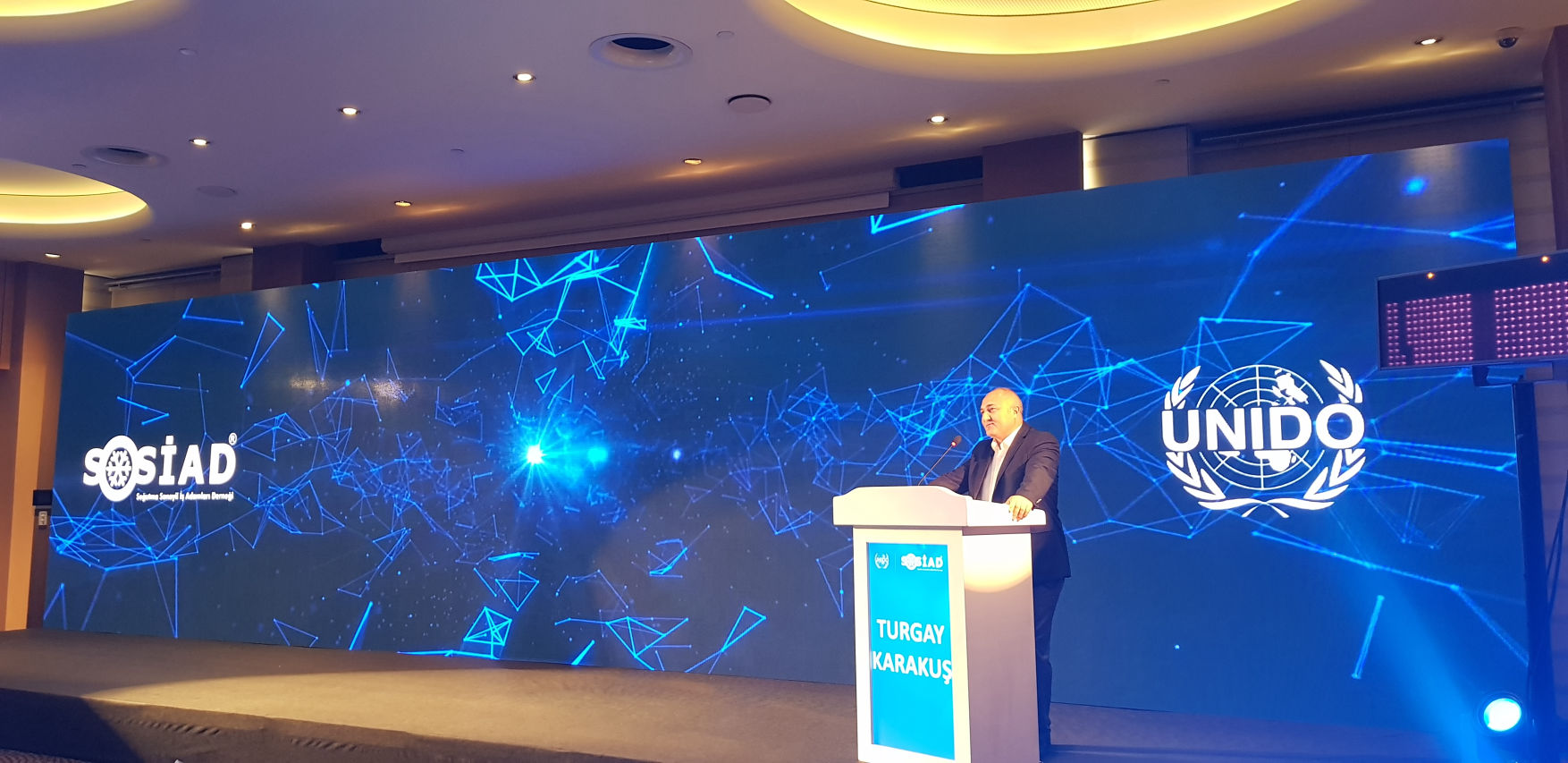
SOSİAD (Association of Refrigeration Industry and Businessmen) conducted its first thematic meeting supporting the fight against climate change and that is in the scope of UNIDO (United Nations Industrial Development Organization) Demonstration Project titled Demonstration and Pilot Activities for Encouraging Low Global Warming Potential (GWP) Refrigerants in the Republic of Turkey” on Tuesday, November 5th, at İzmir Swissotel Büyük Efes with an intense participation by students, academics, producers, final users, after-sale service providers, and representatives of non-governmental organizations.

SOSİAD Chairman of the Board of Directors Mr. Turgay Karakuş noted in his opening remarks that the meeting in the scope of Project is the first meeting towards replacing existing refrigerants at different commercial and industrial refrigerating systems with nature friendly alternatives, evaluating results with tests and measurements and effectively share them with final users and the sector. Karakuş underlined that this project aims to create awareness and covers comparison of refrigerants with high GWP’s against alternative/natural refrigerants such as ammonia (NH3) and carbon dioxide (CO2) with lower levels from different aspects. He emphasized that such outputs include very important results for both investors and industrialists.
Aşan: “There will be a gradual decrease of HFC’s and a quota shall be applied”
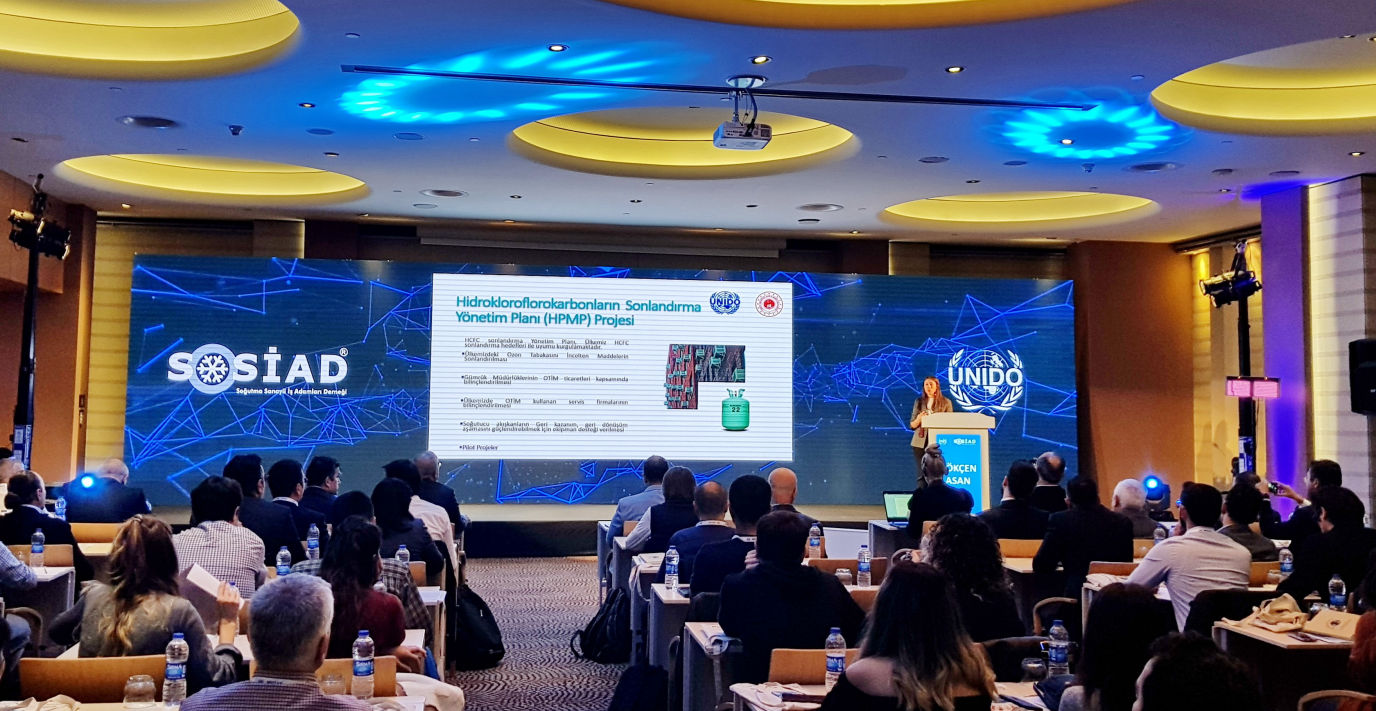
Following opening remarks, National Advisor at Ministry of Environment and Urban Planning, Ms. Zeynep Gökçen Aşan made her presentation titled “Studies on Ozone-Depleting Substances and their Alternatives”. Aşan declared that Turkey is one of the parties to Montreal Protocol as amended in 2016 in Kigali and in this framework; they are aiming to decrease HFC-based greenhouse effect by 50 percent until 2050. She continued to note that the Ministry of Environment and Urban Planning will undertake a gradual decrease in HFC’s in the scope of EU F-Gas Regulation next to Kigali Amendment to the Montreal Protocol and start a quota application. Aşan underlined that this reduction calendar is an important opportunity for developing countries to directly changeover to efficient, ozone-friendly refrigerating systems with low global warming potential.
Kochova: “Refrigerants are responsible for almost 15 percent of human-based greenhouse effect”

After Aşan’s presentation UNIDO Consultant Natasha Kochova made a presentation titled “Overview of Energy Efficiency in the Framework of International Agreements” focused on energy efficiency whereby she gave information on environmental agreements, especially Kigali Amendment to the Montreal Protocol on Substances that Deplete the Ozone Layer agreed at the 28th Meeting of the Parties to the Protocol. Kochova noted that air-conditioning and refrigeration sectors represent a significant and increasing share in the demand for electric power.
Kochova continued to give information about global greenhouse gas emissions and said: “Refrigerants are responsible for around 15 percent of human-based greenhouse effect. In 2015 the EU was responsible for 10 percent of global greenhouse gas emissions. As it stands, it is one of those developed economies with the lowest rates of emission per person.” Kochova noted that equipment producers work very hard to produce new products that use low GWP refrigerants in line with Kigali Amendment and other regional regulations towards fast reduction of HFC’s. Regarding methods that must be taken into account about energy efficiency, Kochova said: “Nowadays alternative refrigeration systems with low GWP’s continue to develop. This might require redesign of some systems and production of different equipment. Of course there must be investment to realize this. There must be willingness to invest and a well-developed plan.”
Aslantaş: “The Project will be a spur in transition to new generation refrigerants”
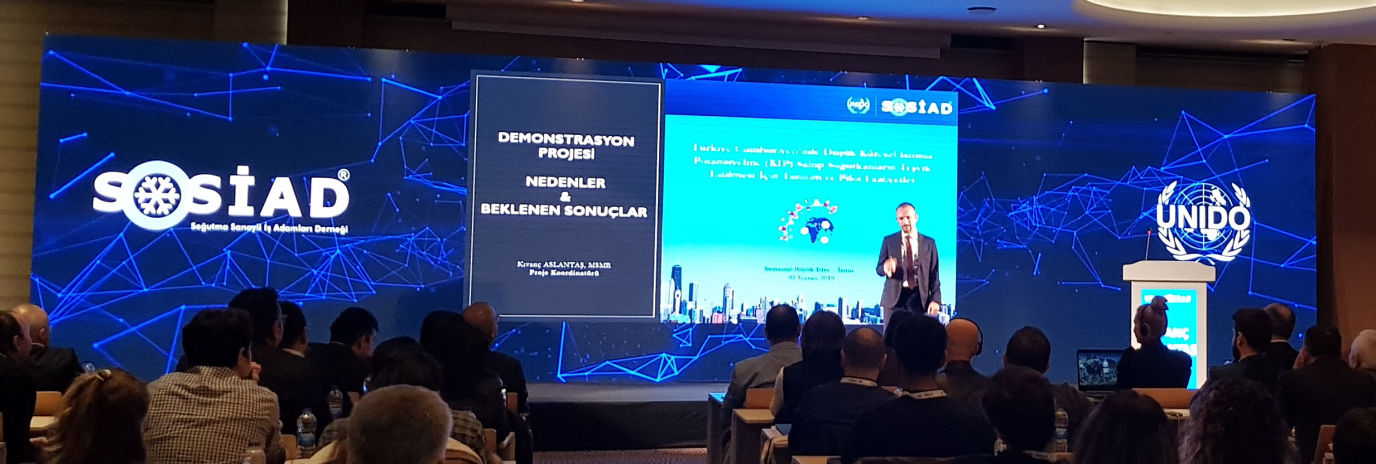
Project Coordinator Kıvanç Aslantaş who made detailed remarks about the Demonstration Project shed light on causes of and expected results from the project. Aslantaş noted that the Republic of Turkey limited use of hydrochloroflorocarbon (HCFC) refrigerants in order to fulfil obligations under the Montreal Protocol. He declared that a decision was taken to undertake studies aiming to decrease use of HCFC’s to 86 percent of calculated reference value. As a result, he underlined the importance of informing users and suppliers and increase awareness. He noted that in the scope of Demonstration Project this awareness shall be increased while important data would be acquired with pilot applications. Aslantaş said they foresee successful transformation of facilities in İzmir, Ankara, and İstanbul with alternative refrigerants as a part of the project. Thus he noted that transformation of existing systems in those three cities to new generation refrigerants with low GWP values with pilot applications will be a spur.
Project Coordinator Kıvanç Aslantaş made the presentation titled “Administrative and Technical Requirements at Transformation Projects” on behalf of Demonstration Project UNIDO National Consultant Barış Uçaner. Aslantaş underlined technical and administrative details for application of this Project that is one of the components of UNIDO’s HCFC Phase-Out Management Plan (HPMP). He drew attention to the importance of ensuring transformation of the existing system to an energy efficient refrigerant with low GWP value and traceability of measurements following transformation for realization of United National Sustainable Development Targets.
Tekcan: “Transformation project at Sarıyer Grocery Store in the scope of the Project ensured 49.83% energy saving.”
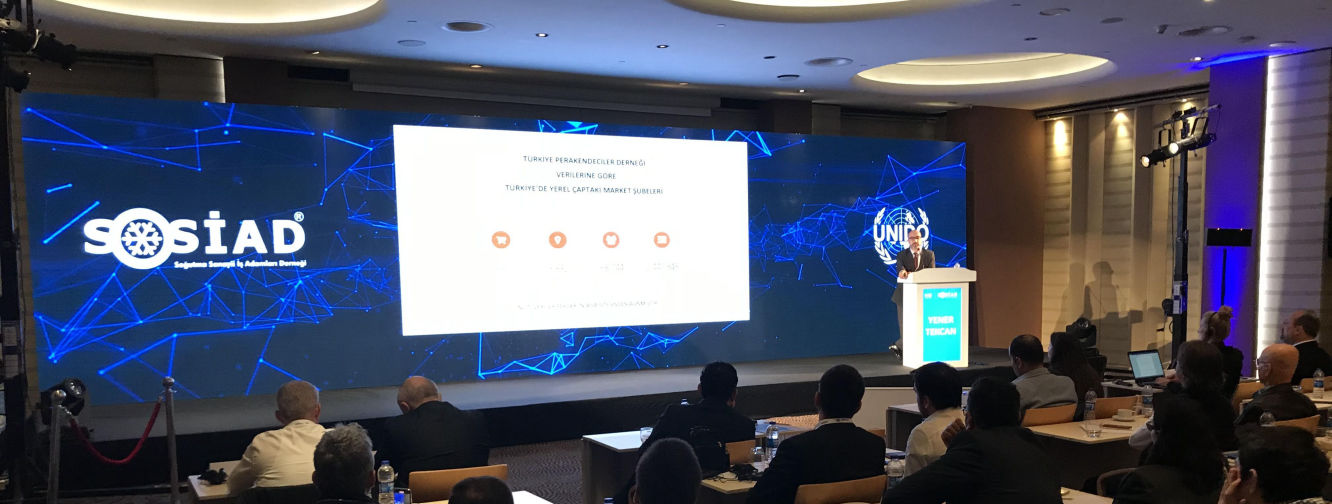
Following Aslantaş, Envoytec General Manager Yener Tekcan gave detailed information to participants on “Sarıyer Market R22/R448A Transformation with R404A/R452A and Energy Analysis”. Tekcan noted that considering the total amount of refrigerants with high GWP values used by retailers, result is in critical numbers. He explained that Envoytec cooperated with SOSIAD in the scope of the Demonstration Project and the energy saved with transformation of three grocery stores is considerable.
He continued noting that the former system was measured for 2 months and as a result the average daily energy consumption is determined to be 389 kWh. Tekcan underlined that with new generation refrigerants the total energy consumption in 37 days remained at 195 kWh and that they achieved a 49.83% energy saving with the transformation project at Sarıyer Grocery Store. He continued to emphasize that such a value demonstrates the importance of investment in instead of avoiding transformation. He expressed that the existing high GWP system in effect for 13 years at Sarıyer Grocery Store which was one of the pilot projects was replaced with a new generation central system to become highly energy efficient, leading to very positive feedback.
Yücel: “With new generation refrigerant compressor working with R1233zd we saved 17,691 tons of carbon dioxide emissions”
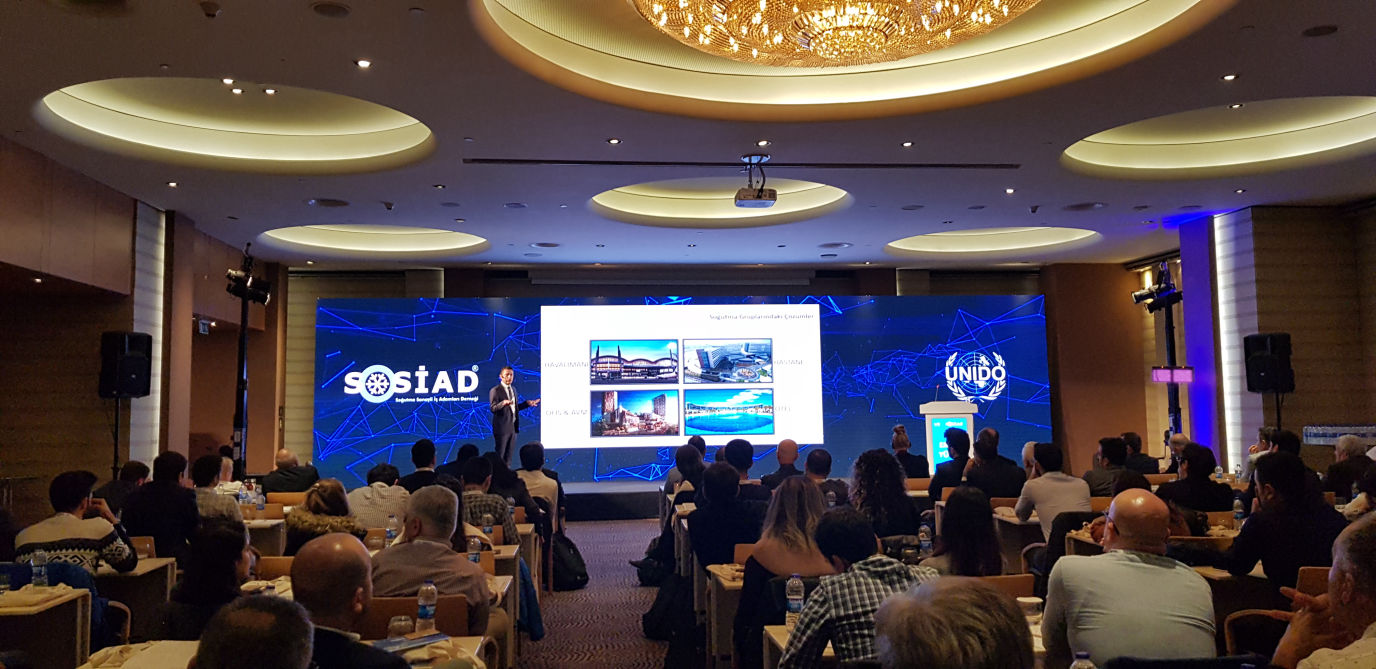
Following Tekcan, Trane Business Development and Sales Manager Ersin Yücel made his presentation titled “Eti Mineral Water R 1233zd Process Chiller Application”. He said that as Ingersoll Holding they will decrease negative effects of global warming sourcing from their products by 50 percent until 2030 and that they are planning to spend 500 million USD to that aim. Yücel said with new generation refrigerant compressor working with R1233zd they have a long-lasting product with low carbon dioxide emission rate and high energy efficiency that can be used at structures such as airports, industrial facilities, hotels, and hospitals. SOSİAD (Association of Refrigeration Industry and Businessmen) conducted its first thematic meeting supporting the fight against climate change and that is in the scope of UNIDO (United Nations Industrial Development Organization) Demonstration Project titled “Promotion and Pilot Activities to Encourage Refrigerants with Low Global Warming Potential (GWP) in the Republic of Turkey” on Tuesday, November 5th, at İzmir Swissotel Büyük Efes with an intense participation by students, academics, producers, final users, after-sale service providers, and representatives of non-governmental organizations.
Yücel continued by saying: “At Eti Mineral Waters project 5 equipment with 5,000 kW refrigerating capacity were used. A comparative analysis was made between this system and the former system in terms of energy efficiency. According to results of analysis annual energy saving reaches 120,000 Euros. This preference ensured Eti Mineral Waters save 648 tons of CO2 emissions annually. Considering the lifespan of a centrifugal compressor is on average 25 years, energy saving by itself results in 16,200 tons of reduction in CO2 emissions. Thanks to using new generation refrigerants, savings in carbon emission reaches 1,491 tons throughout the lifespan of the equipment. Thus, the total amount of saved carbon dioxide emission reaches 17,691 tons.”
Kaymak: “Our production costs are down. Investors are pleased for economy and for energy saving.”
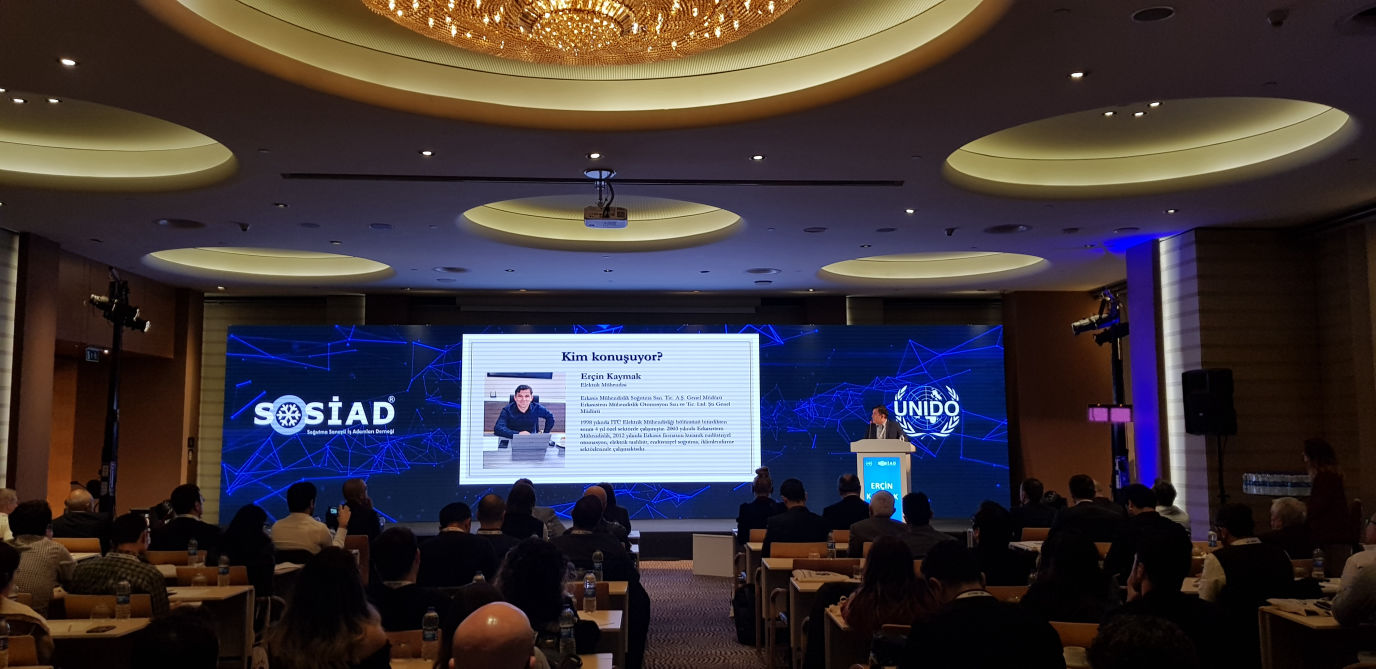
Erkasis General Manager Erçin Kaymak informed participants on “Examination of Ammonia / Carbon Dioxide Cascade Refrigerant Systems” Kaymak mentioned advantages of using cascade (gradual) refrigerant systems and a sample application. Kaymak said, “We are a company that provides services to sectors that need very high refrigerant capacity. Since hardware at refrigerant system applications are very heavy, we have always performed pipework on the field. These factors increased both energy saving and production and labor costs. But we made a different choice at application project. As costs increased, especially companies with relatively low refrigerant capacity system requirements preferred systems with traditional refrigerants. With carbon dioxide use hardware of facilities at the same capacity downsized and especially companies with refrigeration requirements such as cold storage or quick freezing rooms were presented considerable advantages in terms of energy savings and construction. At a facility where we use a carbon dioxide compressor with the same capacity, dimensions of carbon dioxide compressor reduces at 1/5 rate. We note considerable differences in terms of pipe diameter between R134a and ammonia and carbon dioxide systems. Such advantages with the project decrease our production costs even further and we become more acceptable for investors in terms of price and energy saving.”
İsa: “10 months of energy consumption data from our Unilever Algida pilot project is remarkable”
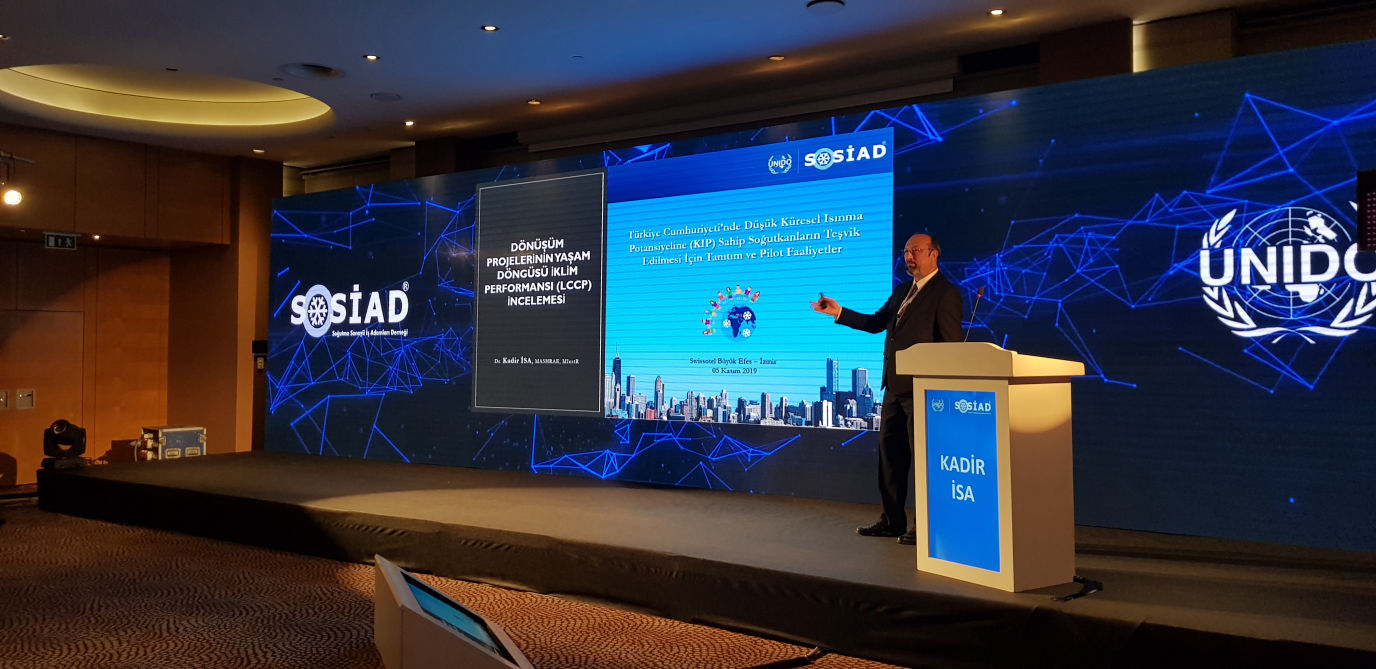
After Kaymak’s presentation Technical Team Leader Dr. Kadir İsa informed participants with his presentation titled “Life Cycle Climate Performance (LCCP) of Transformation Projects”. İsa discussed Life Cycle Climate Performance (LCCP) which expresses effects of HVACR systems on global warming and noted importance of direct emissions sourcing from refrigerants causing global warming throughout their life cycles and indirect emissions sourcing from production and energy consumption processes. He mentioned carbon dioxide and ammonia with low global warming potentials have an important role in this sense.
İsa noted that when we look at 10 years of business energy data of İzmir Unilever Algida carbon dioxide/ammonia (CO2/NH3) cascade system from LCCP dimension, we can see that it is an energy efficient system with low business costs and GWP values.
After Q&A session all project team including Kıvanç Aslantaş, Kadir İsa, Kemal Öz, Engin Sökmen, Furkan Göl, and Sıla Dinç greeted participants following which lunch began. At afternoon session İzmir Unilever Algida facility was visited with participants. Participants were given detailed information about carbon dioxide/ammonia (CO2/NH3) cascade refrigerating system used at the facility.
The next meeting will be held on November 26th at JW Marriot Ankara and the last meeting will be held on December 17th at Fairmont Quasar İstanbul.